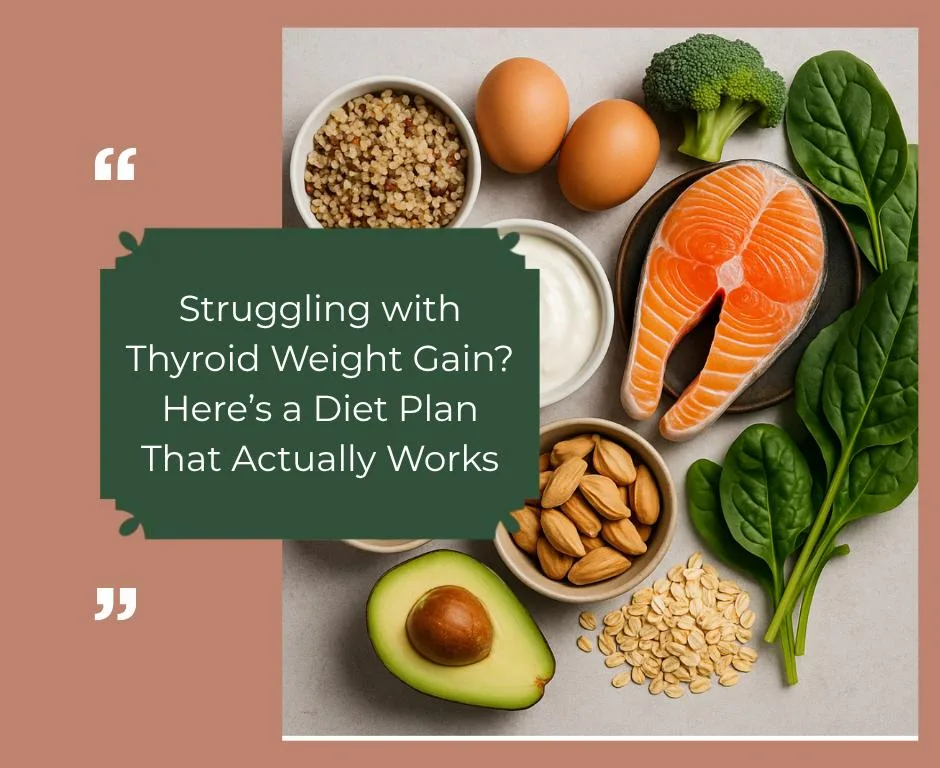If you’ve been diagnosed with hypothyroidism and are frustrated with unexplained weight gain, fatigue, and sluggish metabolism — you’re not alone. The thyroid gland plays a crucial role in regulating metabolism, and when it underperforms, your entire system slows down.
The good news? With the right thyroid diet plan for weight loss, you can naturally support your metabolism, balance hormones, and shed excess weight — safely and sustainably.
At The Health Studio by Richa Doshi, we design evidence-based thyroid nutrition programs tailored to your body’s needs. In this blog, reviewed by Dietician Richa, we’ll break down how thyroid hormones affect weight and what an ideal thyroid-friendly diet looks like.
Understanding How the Thyroid Affects Your Weight
Your thyroid produces two key hormones — T3 (triiodothyronine) and T4 (thyroxine) — that control how your body uses energy. When these hormones are low (as in hypothyroidism), metabolism slows, leading to:
- Weight gain (especially around the abdomen and face)
- Fatigue and muscle weakness
- Hair loss and dry skin
- Constipation
- Mood swings and depression
The goal of a thyroid-specific diet is to naturally stimulate metabolism, support hormone production, and reduce inflammation — all through the power of nutrition.
Thyroid Diet Plan for Weight Loss: The Core Principles
1. Focus on Nutrient-Rich Whole Foods
Choose foods that nourish your thyroid gland and enhance energy metabolism — such as eggs, whole grains, nuts, lean meats, fruits, and vegetables.
2. Balance Iodine and Selenium Intake
These minerals are essential for thyroid hormone production. Include:
- Iodine: iodized salt, seaweed, fish
- Selenium: Brazil nuts, sunflower seeds, and eggs
3. Add Zinc and Iron-Rich Foods
Both minerals support thyroid enzyme function. Sources: spinach, legumes, pumpkin seeds, and lean meat.
4. Go Gluten-Free (If Sensitive)
For some individuals with Hashimoto’s thyroiditis, gluten triggers inflammation. Going gluten-free can help reduce antibody levels and bloating.
5. Control Carbohydrate Quality
Avoid refined carbs (white bread, pastries) that spike insulin. Instead, opt for low-GI complex carbs like millets, oats, and quinoa.
Sample Thyroid Diet Plan for Weight Loss
Note: This plan is generalized. Always consult a nutritionist for a customized version.
Morning (on waking):
- Warm water with lemon or methi seeds
Breakfast:
- Vegetable omelet or moong chilla with green chutney
- Herbal tea (avoid excessive caffeine)
Mid-Morning Snack:
- Handful of nuts (almonds/walnuts) or fruit like papaya
Lunch:
- Brown rice / jowar roti
- Dal or grilled chicken / tofu
- Stir-fried vegetables
- Buttermilk (if tolerated)
Evening Snack:
- Roasted makhana or green tea
Dinner:
- Clear vegetable soup + paneer stir-fry / sautéed veggies with quinoa
- Herbal infusion (chamomile or turmeric milk) before bed
This balanced plan supports thyroid function, improves digestion, and prevents night-time cravings — a major issue for hypothyroid patients.
Foods to Avoid with Hypothyroidism
A thyroid diet for weight loss also means knowing what not to eat. Certain foods interfere with thyroid function or medication absorption:
- Goitrogenic foods in excess — raw cabbage, cauliflower, broccoli
- Soy and soy products
- Refined sugar and processed foods
- Fried foods and trans fats
- Caffeine and alcohol (in excess)
Pro Tip from Dietician Richa: Steam or cook cruciferous vegetables to reduce goitrogen content while retaining nutrients.
Lifestyle Tips for Managing Thyroid Weight Gain
Along with a clean diet, simple lifestyle tweaks can significantly improve thyroid health:
- Exercise regularly: Yoga and strength training boost metabolism.
- Sleep 7–8 hours: Restorative sleep supports hormone balance.
- Stay hydrated: Water aids digestion and detoxification.
- Avoid skipping meals: It slows metabolism further.
- Take medication consistently: As prescribed by your doctor, on an empty stomach.
Expert Insights from Dietician Richa
According to Dietician Richa, founder of The Health Studio by Richa Doshi:
“A thyroid-friendly diet is not about restriction but balance. When you combine the right nutrients, meal timing, and mindful eating, you can truly reset your metabolism and achieve sustainable weight loss.”
Her thyroid management program integrates nutrition, lifestyle coaching, and supplementation guidance for complete hormonal balance.
FAQs About Thyroid Diet and Weight Loss
Q1: Can thyroid patients lose weight through diet alone?
Yes. With a balanced thyroid diet and lifestyle consistency, many patients achieve steady fat loss without crash diets.
Q2: Should I avoid all goitrogenic foods?
No, just limit raw intake. Steamed or cooked cruciferous veggies are safe in moderation.
Q3: Is intermittent fasting safe for hypothyroid patients?
It depends on the individual. Short, gentle fasting windows (under guidance) may help, but extreme fasting can disrupt metabolism.
Q4: How soon will I see results?
With proper guidance, most clients notice improved energy, digestion, and gradual weight loss in 6–8 weeks.
Q5: Does thyroid medication affect diet timing?
Yes. Always take medication on an empty stomach, and avoid eating for at least 30–45 minutes afterward.






